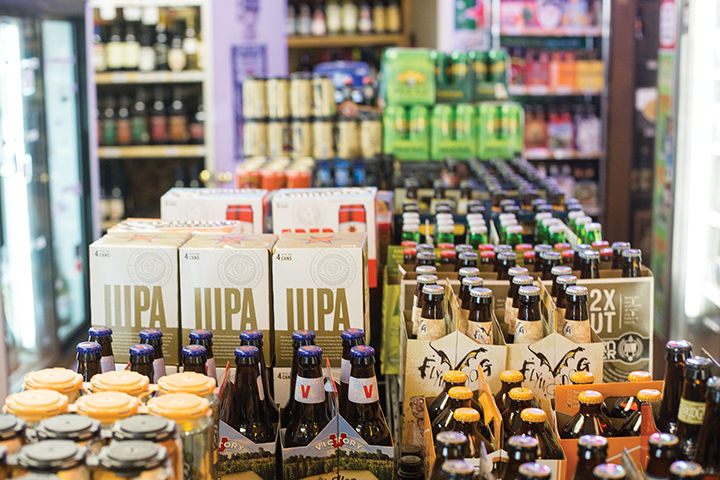
Beer lines a shelf in a local liquor store. Resident Life could be bringing back alcohol and drug-free housing as soon as next year.
Substance-free housing could make a comeback from the ’90s at the University of Maryland, as a Department of Resident Life committee has formed to consider the issue.
Resident Life Director Deb Grandner formed a committee earlier this semester to examine the possibility of offering substance-free housing, in which residents eschew alcohol, smoking and drugs.
This university could see substance-free housing as soon as next fall if the committee suggests it, according to Erin Iverson, committee chairwoman and Resident Life assignments and public inquiry manager. Substance-free housing was a popular option in the ’90s, attracting about 13 percent of on-campus students, according to a 1996 Victoria Advocate article.
When all dorms went smoke-free in 2001, the smoke-free, alcohol-free program essentially ended, said Mike Glowacki, assistant to the director of Resident Life.
READ MORE: Byrd alcohol sales fund alcohol-free events and trips for underclassmen
The committee will face multiple challenges, such as deciding how many units should offer substance-free housing and how to include only students who are truly dedicated to a substance-free lifestyle. The latter proved a problem last time the program existed and eventually led to its demise, Grandner said.
“What we found was that parents were filling out the forms for the students and oftentimes signing them up for substance-free housing,” Grandner said. “When the students would arrive, they really didn’t want to live substance-free, and the students were frustrated.”
Grandner said she decided to establish the committee after receiving several emotional phone calls from parents last summer with concerns about substance-abuse support.
“I haven’t had calls like that for a while,” Grandner said. “The calls really got me thinking about the need to offer something that could be more supportive to students.”
READ MORE: UMD dorms are getting two-ply toilet paper
The Residence Hall Association also raised the idea with Grandner about a year ago, she said.
The committee began meeting earlier this month and expects to finalize its recommendation by February, Iverson said.
The committee’s work begins with analyzing peer institutions’ policies, including those at fellow Big Ten schools, and gauging student interest by conducting a student survey early next month, Iverson said.
The formation of the committee comes after a litany of changes related to alcohol at this university. The university approved on-campus student tailgates at football games just more than two years ago. Byrd Stadium began selling alcohol at athletic events in September, and on-campus restaurant Adele’s decided over the summer to establish a happy hour featuring beer and wine.
A 2014 study that examined nine colleges in this state, including this university, found that 47 percent of students had engaged in binge drinking at least once during the past month and 90 percent of students reported that alcohol is easy or very easy to obtain. Only 20 percent of students reported abstaining from drinking for at least the past year.
While Student Government Association President Patrick Ronk stopped short of calling the current campuswide attitude toward drinking a dramatic shift from years past, he said he has noticed a change in culture.
READ MORE: RHA sets agenda for semester, reinstates constitutional committee
“The university has acknowledged students drink while making sure if they are doing it, they are in a safe, controlled environment and encouraging the environment of social drinking as opposed to binge drinking,” Ronk said.
Grandner also said she has seen a change on the campus related to alcohol, though she is not sure whether that has triggered an increase in interest for substance-free housing. Iverson said there was no connection between the committee’s formation and recent alcohol changes.
“I wouldn’t say it’s a reaction,” Iverson said. “I can see where that connection could be made, but the reality is we, as Resident Life, respond to the needs and desires of our students at all times in different capacities.”
Ronk said the growing trend of responsible social drinking on the campus can coexist with students who live substance-free lifestyles, highlighting the success of the alcohol-free Terps After Dark program. Terps After Dark is partially funded by revenue from Byrd Stadium alcohol sales.
Iverson emphasized that the committee was formed to investigate the option of substance-free housing in the interest of increasing student-housing options, not to respond to the recent policy changes involving alcohol.
“For every one of our students, we want them to know they have a rightful place in our residence halls, that they live in a space that makes them feel the most comfortable and the most safe,” Iverson said. “That’s our overall goal for all residents.”



